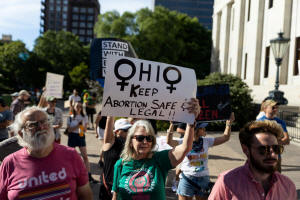Ohio special election could determine future of abortion rights in the
state
 Send a link to a friend
Send a link to a friend
 [August 08, 2023]
By Joseph Ax [August 08, 2023]
By Joseph Ax
(Reuters) - Ohio voters will decide in a special election on Tuesday
whether to make it more difficult to pass state constitutional
amendments, including a November ballot initiative that would protect
abortion rights statewide.
The Republican-backed constitutional measure would raise the threshold
to approve an amendment from 50% to 60% of the vote, while also
implementing more stringent standards for amendments to get on the
ballot in the first place.
Tuesday's ballot question, known as Issue 1, does not specifically
address abortion, but the timing is no accident. If it passes, a
super-majority of voters would be required to approve a November
referendum that seeks to enshrine abortion rights into the state
constitution.
Polls have found that the percentage of voters who favor the abortion
amendment is just shy of 60%, suggesting Issue 1 could determine the
outcome. Political groups on both sides of the abortion issue have
poured millions of dollars into the state ahead of the vote.
Tuesday's election, scheduled by the Republican-controlled legislature,
is the latest statewide battle over abortion more than a year after the
U.S. Supreme Court eliminated a nationwide right.

Ballot initiatives have become powerful tools for abortion rights
activists in states where abortion opponents, usually Republicans,
control the legislature or hold the governor's office.
Voters in Kansas and Kentucky, both solidly conservative states,
rejected measures last year that would have declared that their state
constitutions do not protect abortion rights.
Early voting turnout in Ohio appeared to be extraordinarily high for an
August special election. As of Friday, more than 575,000 early votes had
been tallied, according to the Ohio secretary of state's office, already
nearing the total number of ballots cast in last year's August primary
election for state legislative seats.
There were long lines at some polling locations over the weekend,
according to local news reports.
Early voter turnout in Ohio appeared to be extraordinarily high for an
August special election. The Ohio secretary of state's office said more
than 575,000 early votes were cast as of Friday, already nearing the
total number of ballots cast in last year's August primary election for
state legislative seats.
Some polling locations were reported to have long lines over the
weekend.
MILLIONS IN SPENDING
Republican Governor Mike DeWine signed a six-week abortion ban into law
in 2019, which went into effect following the Supreme Court's decision.
The ban was put on hold in September after a legal challenge from
abortion clinics; the Ohio Supreme Court has agreed to decide the case.
[to top of second column]
|

An abortion rights protester holds a
sign to keep abortion safe in Ohio at a rally in Columbus, Ohio,
after the United States Supreme Court ruled in the Dobbs v Women's
Health Organization abortion case, overturning the landmark Roe v
Wade abortion decision, June 24, 2022. REUTERS/Megan Jelinger/File
Photo

Some groups opposed to Tuesday's ballot question have emphasized
that the referendum goes beyond abortion, arguing it is simply
undemocratic to curb citizens' power.
"This is much larger than one issue; it's much larger than one party
or one election," said Jen Miller, the executive director of the
League of Women Voters of Ohio. "This is about a freedom that
Ohioans have had for more than a century."
For instance, good government groups are working on a ballot
question for 2024 that would amend the constitution to prevent
gerrymandering, the process by which one party manipulates district
lines to entrench power. If Tuesday's referendum succeeds, getting
that issue on the ballot would be far more challenging.
Last year, Ohio Republicans drew sharply partisan state legislative
and congressional maps and defied court orders to revamp them;
November's elections were held using maps that had been ruled
unconstitutional.
Abortion rights opponents have called the November referendum
extreme, claiming its vague language would allow minors to get
abortions and gender-affirming surgery without parental consent.
Supporters note that the amendment makes no mention of
gender-affirming treatment or parental consent.
Tuesday's election has drawn millions in outside spending, including
from so-called "dark-money" groups that are not required to disclose
their donors.
Illinois Republican mega-donor Richard Uihlein has donated at least
$4 million to the pro-Issue 1 campaign, according to campaign
filings. Other groups supporting Tuesday's referendum have collected
funds from Susan B. Anthony Pro-Life America and The Concord Fund, a
conservative dark-money group.
The anti-Issue 1 side has gotten support from the Tides Foundation,
a California-based social justice organization, and the Sixteen
Thirty Fund, a liberal dark-money group.
(Reporting by Joseph Ax; Editing by Cynthia Osterman)
[© 2023 Thomson Reuters. All rights
reserved.]This material may not be published,
broadcast, rewritten or redistributed.
Thompson Reuters is solely responsible for this content.
 |